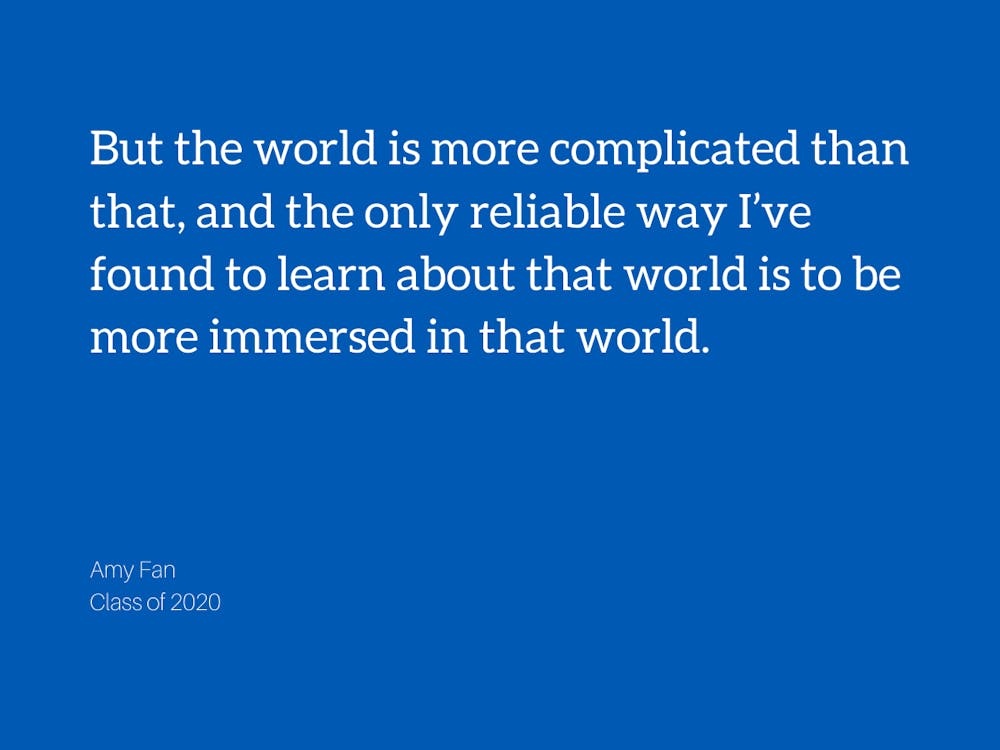Hi Luke (and the rest of DIIG),
I'm Amy. I don't think we've met before, but I’m about to graduate in a few months. A friend sent me your column on impact investing, and it reminded me a bit of where I was during my sophomore spring.
Some context: At the beginning of 2018, I had already declared my math major and settled on the economics minor, mostly because I refused to take macroeconomics for the major. Shortly after, I started wondering (or at least strongly felt the need to wonder) what was I going to do with my degree. One of the ultimate sells for the math major was how broadly applicable it was. I had been told my quantitative skills could help me answer any question I wanted—even the ones for positive social good.
When I was looking for internships though, the main market for my quantitative skills (and the places with what seemed like the more interesting questions) seemed to be primarily finance and tech. On the other hand, the main market for my interests in societal issues seemed to be… not designed for people who liked math. In fact, if felt near the opposite. That winter break, I had emailed an alum with this frustration, and asked for some guidance on where to look. She responded back with a phrase that seemed to neatly summarize my interests: "a quant background with a focus on social impact."
Was that me? Was that who I wanted to become? Was I, Amy Fan, "quant background with a focus on social impact?" College hadn't told me who I was yet, but it sounded nice, and it sounded like something I could work towards for the next two years. That alum also recommended that I check out two companies: 1) Omidyar, a philanthropic investment firm started by Pierre Omidyar, the founder of eBay, and 2) Palantir, which she framed as "big data 'for the common good.'"
We don't need to talk about Palantir—that's been done enough already. (To be fair, during my sophomore year, the main thing I had to be skeptical of was Palantir’s huge contracts with the Department of Defense.) But a philanthropic investment firm sounds close to what DIIG is trying to do.
You included a slew of data to showcase the good that impact investing, broadly, has done. I have a few thoughts on most of the evidence you used and how you interpreted it that I’ll include at the end of this column, but fighting evidence with evidence isn’t what I came here to do.
Instead, I’ll start here: I'm glad you notice that there are problems in our society, because that sometimes seems to be lost in the preprofessionalism of Duke. I’m glad that you notice that social inequality and environmental degradation are pressing problems, and I see an impressive list of projects that y'all have helped with.
At the same time, I would argue that there are other, more pressing questions that need to be asked before a problem is defined and a solution applied.
As Gino noted in his original column, are the problems impact investing seeks to fix actually caused by the wealth inequality that the finance industry perpetuates? Is the problem a lack of efficient markets or innovation, or other stronger social, political forces? To what extent is finance the solution—and to what extent is it the problem? Are powerful institutions blocking the path to change?
A few weeks ago, Darren Walker—the president of the Ford Foundation—came to speak to Duke. The impact investing sphere at its core seems similar to the philanthropy sphere in that it aims to use large amounts of wealth to do good in this world. Among other things, Walker noted the antidemocratic nature of philanthropy. In particular, he talked about how John D. Rockefeller donated money to Spelman College (named after his wife) so that Black women could be educated, but he would never have supported Black women going to the same colleges as his daughters. Andrew Carnegie strongly believed that everyone should have a library—but not necessarily access to the same kinds of books.
As I’ll explain in more detail below, the “government-backed” development financial institutions you claim are examples of positive change, typically use international development funds from developed countries to fund projects in developing economics, a move that reeks of neo-colonialism. Perhaps it’s easier to address environmental and energy needs in African countries than the chronic underdevelopment of the African continent as a whole. Both do some good, sure, and maybe in a highly controlled experiment where nothing else changes except for the specific way money is allocated (as is commonly done in science and in other highly quantitative fields), perhaps it’s better that things are these institutions exist than not.
But the world is more complicated than that, and the only reliable way I’ve found to learn about that world is to be more immersed in that world. Long story short, I did not check out Omidyar or Palantir, and I no longer think about being “quant background with a focus on social impact.” There seemed to be other, more pressing questions at stake that a set of tools and methods couldn't answer.
I imagine you have a community of people in DIIG who support your decision, even share your goals, who may back your decision and shape your views as you read this. Maybe some of them were at the same point as I was during their sophomore year when they chose to join DIIG. To be quite honest, I don't think I have a similar group, at least professionally. I’m not sure how many of my peers share my concerns.
One last point: You note that DIIG’s education program has “empowered entrepreneurs looking to serve underrepresented minorities” and “explicitly advocate[s] an alternative route away from traditional pre-professional roles,” yet I looked at many of the LinkedIn Premium profiles of your executive team, and it makes me wonder: alongside these explicit messages, what is DIIG implicitly communicating?
Best of luck.
Amy
P.S. As noted above, here are the concerns I had about the evidence you used:
- You write that government-backed development financial institutions comprise a quarter of impact investment. A quick read on the Wikipedia page on DFIs reveals that oftentimes, governments in developed countries fund DFIs in developing countries. Isn’t this just foreign aid—at best, nothing novel (asides from a PR rebranding), and at worst, masking the power relations that seem to characterize foreign aid?
- The CFDI is less than 2% of total impact investment, so small that it's lumped into the "other" category. Given that the 1.5 million jobs that you cited were created over 24 years, this isn't terribly surprising. (That averages out to about 5,200 jobs a month. For reference, the Bureau of Labor Statistics estimated that 225,000 jobs were added to the economy in January 2020.)
- You wrote that “45 countries have adopted public frameworks for impact investing and 20 have created legal definitions for “social enterprise.”...ensuring that the future is shaped not just by corporations, but by a diverse array of perspectives from public servants to non-profit leaders.” Yet looking at the link you cite, there’s nothing claiming anything remotely close to a regulatory or accountability mechanism, much less anything that ensures that public servants and non-profit will have a seat at the table.
Amy Fan is a Trinity senior. Her column, "fangirling," runs on alternate Wednesdays.
Get The Chronicle straight to your inbox
Signup for our weekly newsletter. Cancel at any time.

Amy Fan is a Trinity senior. Her column, "fangirling," runs on alternate Thursdays.

